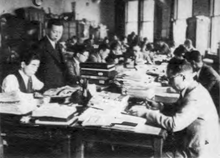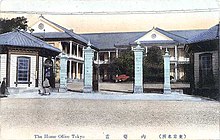Naimu-shō

The Naimu-shō ( Japanese 内務 省 , "Ministry of Internal Affairs", English Home Ministry , sometimes also Ministry of Internal Affairs , Interior Ministry, etc.) was one of the most powerful ministries of the central government in the Japanese Empire .
Established in 1873, its tasks included internal security, the police , regional administrations, public construction, until 1938 the social and health services and after the dissolution of the Ministry of Religions ( 教 部 省 , kyōbu-shō ) in 1877 the State Shintō . From 1897 until the (re) establishment of the Colonial Ministry in 1929, it also oversaw the Government General ( sōtokufu ) of the Japanese colony of Taiwan . In 1947 it was dissolved by the Katayama Cabinet following orders from the occupation authorities ( GHQ / SCAP ) .
The most important successor authorities were the Ministry of Social Affairs established in 1938 and, after the dissolution in 1947:
- for the police initially a multi-part, partly municipal police organization, since the 1950s indirectly the National Commission for Public Security , the Prefectural Commissions for Public Security, the National Police Authority and the 47 Prefectural Police,
- for the building industry, the building ministry - today part of the MLIT and
- the “Ministry of Self-Government” and the local authorities themselves for the local administrations . The governors of the prefectures and the mayors of all municipalities , initially temporarily including the districts of Tokyo , were elected directly by the people from 1947 onwards.
The "Special Higher Police" ( Tokubetsu Kōtō Keisatsu ), which acted as a political security service and performed secret service tasks, was dissolved by the SCAP in 1945. Censorship was also one of the tasks of Naimu-shō before it was abolished in 1945 and henceforth exercised by the Civil Censorship Detachment .
